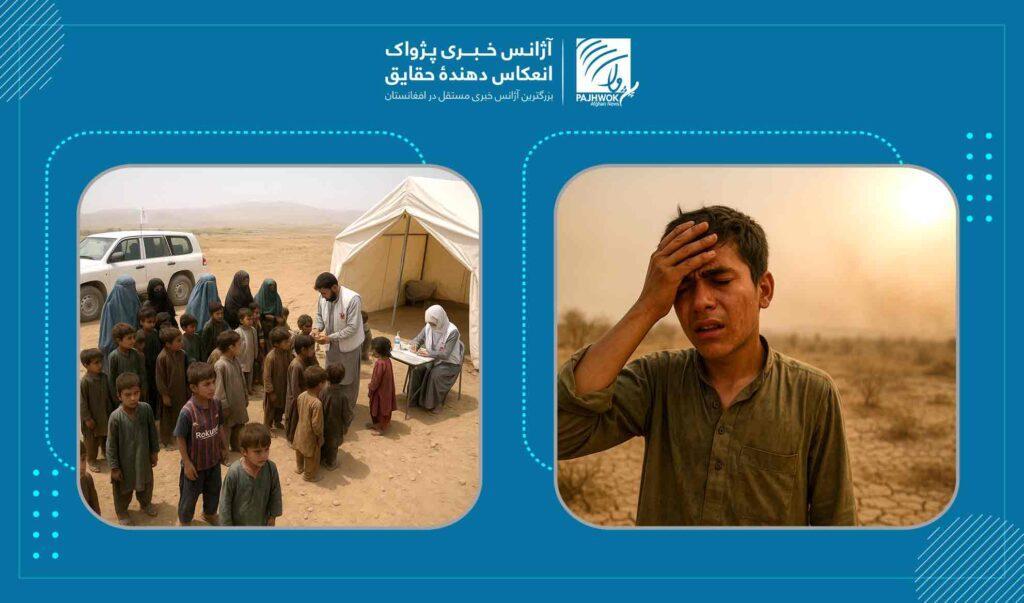
Negative Impacts Of Climate Change On Afghanistan's Health Sector
KABUL (Pajhwok): Climate change has also adversely affected the health sector in Afghanistan and has led to an increase in some diseases. Analysts say that people should be made aware of this issue and the government and the international community should take necessary measures.
The Earth's climate is undergoing rapid transformation. Global warming causes droughts in some regions and triggers severe storms, heavy rainfall and floods in others. Glaciers are melting at alarming rates, resulting in rising river water levels.
Research indicates that climate change, particularly the increase in rainfall and glacier melt, may even amplify underground hazards such as earthquakes and volcanic activity.
Although Afghanistan contributes very little (0.19 percent) to global greenhouse gas emissions, the United Nations Office for the Coordination of Humanitarian Affairs (OCHA) ranks the country fourth among nations most affected by climate change.
Impacts of climate change on health
Dr. Wahdat Alkhozi, Head of Therapeutic Medicine at the Ministry of Public Health (MoPH), explains that climate change has directly contributed to the rise of infectious diseases, as these infections thrive under certain environmental conditions and temperature ranges.
He notes that dengue fever, previously unknown in Nangarhar, has now appeared due to climate change and malaria is emerging in Kabul, where it was previously absent.
Dr. Alkhozi also emphasizes that reduced water availability and declining crop yields caused by climate change contribute to malnutrition, particularly among children.
He adds that natural disasters such as floods and earthquakes, increasingly linked to climate change, create additional health challenges, including mental health problems and other medical conditions for affected populations.
On August 31, around 12 a.m., a 6.0 magnitude earthquake struck the provinces of Kunar, Nangarhar, Laghman, Panjshir and Nuristan.
According to government reports, the disaster claimed 2,205 lives and injured 3,640 in Kunar; 12 lives were lost and 255 injured in Nangarhar; and 80 people were injured in Laghman. Approximately 6,782 homes were destroyed.
The World Health Organization (WHO) reported that survivors in Kunar are suffering from severe psychological issues.
Akhtar Mohammad, a resident of Kunar who lost 17 family members in the earthquake, said he constantly recalls memories of his deceased relatives, causing him significant mental distress.
Dr. Alkhozi noted that air pollution, intensified by climate change, leads to an increase in respiratory and allergic diseases, which in some cases can even develop into cancer.
Dr. Niko Nishan Momen, a respiratory specialist at Kabul's French Hospital, corroborates this observation, stating that respiratory illnesses have“increased several times” compared to previous years due to climate change.
He explains that Afghanistan's rising temperatures and prolonged droughts have intensified air pollution and dust storms.“This has a direct negative effect on respiratory diseases. Dry air and temperature fluctuations significantly contribute to the increase in breathing problems,” Momen added.
Affected people
A report from Pajhwok notes that residents in Ghazni province have suffered various illnesses due to severe drought and air pollution, a situation confirmed by local health officials, who urge residents to follow health guidelines.
Sher Agha, a resident of the Zama area in Kabul's Kalakan district, stated that he has experienced respiratory problems for the past two years.“I work in gardens and on farms; strong winds constantly sweep through our area, which have intensified over the past few years. I understand that these winds and dust are causing my illness. Doctors have advised me to protect myself from dust and soil,” he said.
Despite receiving treatment for two years, he continues to struggle with the condition.
Najibullah, a resident of Kabul's 21st district, said,“There are 11 people in our household, and if I tell you that everyone is sick, you wouldn't believe it. Some have sore throats, others have colds, and some suffer from body aches. These illnesses are caused by a lack of rainfall and polluted air.”
Expert analysis
Climate expert Syed Mohammad Sulemankhel explained that over the past decades, global population growth, industrialization, excessive fossil fuel consumption (oil, coal, gas), deforestation and the loss of green spaces have increased atmospheric gases like carbon dioxide and methane. These gases trap the sun's heat in the atmosphere, raising global temperatures-a phenomenon known as the“greenhouse effect.”
He noted that this has led to rising global temperatures, unstable weather patterns, droughts, floods, heavy rainfall, and heatwaves.
In Afghanistan, such changes have severely impacted agriculture, public health, water resources and the economy.
Sulemankhel warned that without controlling deforestation, air pollution and irresponsible energy consumption, these adverse effects will worsen.
Recommended solutions
Sulemankhel emphasized the need for public education on the use of clean water, planting trees, avoiding air pollution, and strengthening health services to respond swiftly to natural disasters caused by climate change.
He added that governments, international organizations and citizens must work together to take practical measures for environmental protection.
He also noted that winter exacerbates air pollution, and people should use air filters while being educated on precautionary measures to prevent illness during periods of poor air quality.
Dr. Momen suggested increasing public awareness about air quality, expanding green spaces, regulating older vehicles, and ensuring safe fuel for stoves in the coming winter.
He stressed that the government should also develop national climate change strategies and coordinate with international organizations to secure support for Afghanistan.
Mohibullah Bahar, spokesperson for the National Environmental Protection Agency (NEPA), reported that last year, the agency conducted about 1,700 public awareness programs across 34 provinces in mosques, universities, schools, and other public spaces.
He added that NEPA has public awareness offices in all 34 provinces, and this initiative is ongoing.
Bahar noted that Afghanistan has been severely affected by climate change, including droughts, untimely rainfall, storms, and floods, impacting people across multiple sectors. Nevertheless, NEPA continues efforts at both the national and international levels to address these challenges and mitigate the negative effects of climate change.
sa

Legal Disclaimer:
MENAFN provides the
information “as is” without warranty of any kind. We do not accept
any responsibility or liability for the accuracy, content, images,
videos, licenses, completeness, legality, or reliability of the information
contained in this article. If you have any complaints or copyright
issues related to this article, kindly contact the provider above.


















Comments
No comment